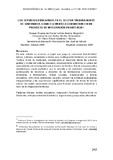Mostrar el registro sencillo del ítem
Los servicios educativos en el sector Táchira-Norte de Santander, como elemento a considerar en un proyecto de integración fronteriza
| dc.rights.license | http://creativecommons.org/licenses/by-nc-sa/3.0/ve/ | |
| dc.contributor.author | Alvarez de Flores, Raquel | |
| dc.contributor.author | Mogollón, Inés B. | |
| dc.date.accessioned | 2011-10-18T21:03:59Z | |
| dc.date.available | 2011-10-18T21:03:59Z | |
| dc.date.issued | 2011-10-18T21:03:59Z | |
| dc.identifier.issn | 1316-6077 | es_VE |
| dc.identifier.uri | http://www.saber.ula.ve/handle/123456789/33902 | |
| dc.description.abstract | En este artículo se examina el papel que juega la educación formal inicial, básica, primaria, secundaria y media para la integración fronteriza en el sector Táchira- Norte de Santander, considerando el desarrollo desde los primeros grados y niveles del sistema educativo, el pensamiento ambiental, la cultura del conocimiento y la investigación sobre la zona de frontera. Desde una perspectiva metodológica cuanti-cualitativa, con la consulta a las entidades competentes, participación de directivos y docentes de las instituciones seleccionadas, entrevistas a historiadores, líderes sociales, empresariales y líderes educativos, entre otras actividades, se pudo conocer las prácticas pedagógicas integracionistas y las experiencias significativas alrededor de temas de interés común, las cuales representan insumos para formular propuestas educativas a favor de la integración fronteriza. | es_VE |
| dc.language.iso | es | es_VE |
| dc.rights | info:eu-repo/semantics/openAccess | |
| dc.subject | Niveles educativos | es_VE |
| dc.subject | Integración fronteriza Táchira-Norte de Santander | es_VE |
| dc.subject | Enfoque ambiental biocéntrico | es_VE |
| dc.subject | Experiencias y propuestas educativas | es_VE |
| dc.title | Los servicios educativos en el sector Táchira-Norte de Santander, como elemento a considerar en un proyecto de integración fronteriza | es_VE |
| dc.title.alternative | The educational services in Táchira-norte de Santander zone, as an element to consider in a frontier integration project | es_VE |
| dc.type | info:eu-repo/semantics/article | |
| dc.description.abstract1 | This article looks at the role of the initial formal education, basic, primary, secondary and media for border integration in Táchira-Norte de Santander zone, considering the development from the first grades and levels of the educational system, environmental thinking, the culture of knowledge and research about the border area. From a quantitative-qualitative methodological perspective with the advice of the competitive entities, directives participation and teachers from the selected institutes, interviews made to historians, social leaders, entrepreneurs and educational leaders, among other activities, It was able to know the integrationists teaching practices and the significant experiences about issues of common interest, which represents inputs for educational proposals in favour of frontier integration. | es_VE |
| dc.description.colacion | 217-236 | es_VE |
| dc.description.email | raflores67@hotmail.com | es_VE |
| dc.description.email | indita48@hotmail.com | es_VE |
| dc.description.frecuencia | semestral | es_VE |
| dc.identifier.depositolegal | 199-602TA950 | es_VE |
| dc.subject.facultad | Núcleo Táchira (NUTULA) | es_VE |
| dc.subject.keywords | Educational levels | es_VE |
| dc.subject.keywords | Frontier integration Táchira-Norte de Santander | es_VE |
| dc.subject.keywords | Environmental biocentric approach | es_VE |
| dc.subject.keywords | Experiences and educative proposals | es_VE |
| dc.subject.publicacionelectronica | Revista Geoenseñanza | es_VE |
| dc.subject.seccion | Revista Geoenseñanza: Artículos | es_VE |
| dc.subject.thematiccategory | Geografía | es_VE |
| dc.subject.tipo | Revistas | es_VE |
| dc.type.media | Texto | es_VE |
Ficheros en el ítem
Este ítem aparece en la(s) siguiente(s) colección(ones)
-
Geoenseñanza - Volumen 014(2) - 2009
julio - diciembre 2009


